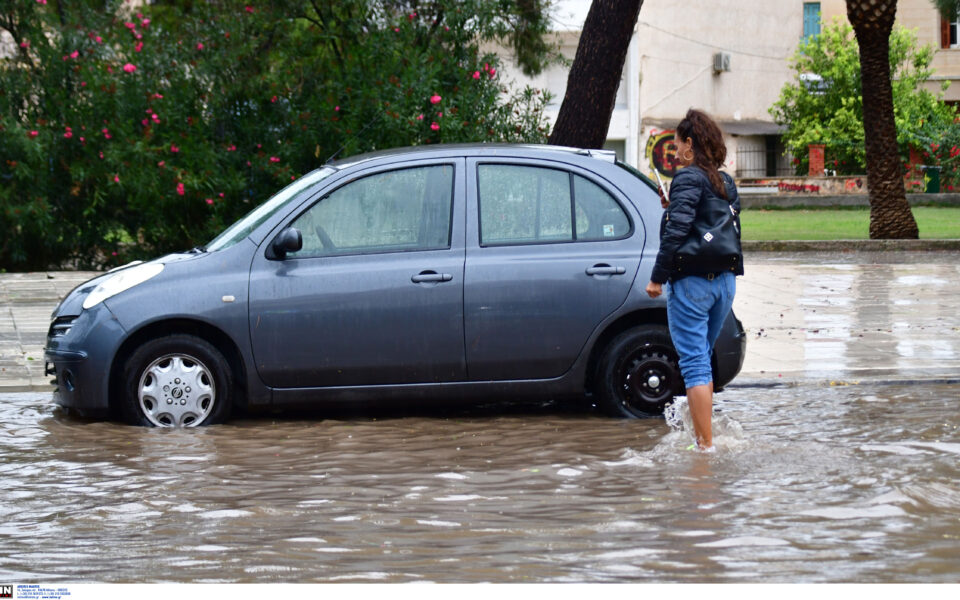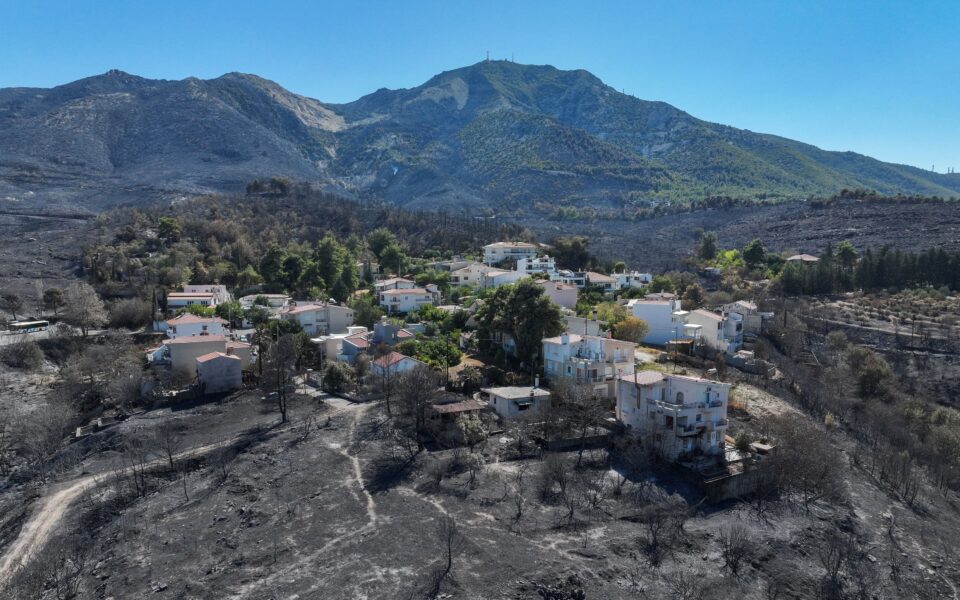Australia urged to ramp up climate action as COP26 ends with deal to ‘phase down’ coal


Australia is being urged to take stronger climate action this decade, as the United Nations climate summit ends with a specific call to “phase down” – instead of phase out – coal and fossil fuel subsidies.
COP26 talks in Glasgow wrapped up on Saturday (local time), with world leaders reaching an agreement that aims to keep within reach the 2015 Paris Agreement goal of limiting Earth’s warming to 1.5 degrees Celsius above preindustrial levels.
For the first time in 26 years of UN climate summits, the final agreement includes a specific call to “accelerate efforts towards the phase-down of unabated coal power and inefficient fossil fuel subsidies”.
It recognises that limiting warming to 1.5 degrees requires reducing global carbon dioxide emissions by 45 per cent by 2030 on 2010 levels.
Countries, including Australia, are asked to “revisit and strengthen their 2030 climate targets” to align with the Paris goal by the end of next year – three years earlier than agreed upon in Paris.
Australia set out a net zero emissions by 2050 target ahead of COP26. It has also set a 26 to 28 per cent reduction on 2005 emission levels by 2030, with government modelling projecting up to a 35 per cent reduction by then.
Energy Minister Angus Taylor and Minister for Foreign Affairs Marise Payne said on Sunday that the government’s 2030 target is fixed.
“Australia’s 2030 target is fixed and we are committed to meeting and beating it, as we did with our Kyoto-era targets,” they said in a joint statement following the conclusion of the talks.
The government welcomed the finalisation of the so-called Paris Rulebook, adding it will “always stand up for and make decisions in Australia’s national interest, and … do what’s right for rural and regional communities”.
Speaking to the ABC’s Insiders earlier on Sunday, Federal Health Minister Greg Hunt also welcomed the outcome at Glasgow but would not say whether Australia would update its 2030 target.
“We’re projecting reaching a minus 35 per cent actual pathway. So we are meeting and beating our targets,” Mr Hunt said.
When pressed by host David Speers on whether Australia would update the target, he said: “We’ve set our target. But what we’ll continue to do is update our projections.”
The health minister went on to quote Shakespeare. “It reminds me of Prince Hal to Hotspur in Henry IV – ‘I never promised to pay thee, but now that I’m here, I’ll pay thee double’,” he said. “It means under-promise, over-deliver.”
In his final remarks after two weeks of negotiations, Britain’s COP26 President Alok Sharma said, “I think today, we can say with credibility that we have kept 1.5 degrees within reach”.
“But, its pulse is weak. And it will only survive if we keep our promises, if we translate commitments into rapid action and if we deliver on the expectations set out in this Glasgow climate pact to increase ambition to 2030 and beyond,” he said.
‘Not the deal the world needed’
Climate groups say while important progress has been made in Glasgow, the final agreement has not delivered the ambition needed to avert warming and help countries adapt or recoup damages from climate disasters already unfolding globally.
Pledges made at COP26 still leave the world on track for over two degrees of warming, the Climate Council says, meaning success depends on commitments and actions being rapidly scaled up.
The deal saw a last-minute change to the language around coal, which was watered down throughout the course of the summit. India, backed by China and other coal-dependent developing nations, raised objections to this part of the agreement and asked for the wording to be rewritten.
The clause was hurriedly amended to ask countries to accelerate their efforts towards a coal power “phase down” instead of “phase out”.
Greenpeace Australia Pacific CEO David Ritter said while the final text of the agreement is far from perfect, the message to Australia and other fossil fuel producers is clear.
“This is not the deal the world needed, but it is what has been delivered – and the momentum is in the right direction,” he said.
“The task ahead is relentless pressure on the fossil fuel corporations and reckless governments such as Australia’s.”
The Climate Council’s Dr Simon Bradshaw said 140 countries lifted their game on climate action at COP26, while Australia cemented its reputation as a “laggard and blocker”.
“The federal government showed up empty-handed to a pivotal moment in the fight for our future. They’ve let down our Pacific neighbours, as well as Australians who do not deserve to endure more frequent and severe bushfires, floods, droughts and heatwaves,” Dr Bradshaw said.
“As our allies and trading partners rise to the climate challenge, we’re stuck in a polluting past with a handful of countries including Russia and Saudi Arabia.”
He said the message from the rest of the world to Australia is clear: “Come back in 2022 with a much stronger target for 2030 and a plan to move beyond coal and gas.”
Gavan McFadean from the Australian Conservation Foundation’s climate program agreed, claiming Australia brought no leadership nor ambition to the summit, despite it seeing breakthroughs such as in lifting pollution reduction targets and slashing methane pollution.
“The gap between Australia and some of its closest allies and trading partners – like the US, UK and the EU – has widened and it will result in dire consequences for our climate, economy and jobs,” he said.
“Australia is one of the sunniest and windiest places on earth, we are missing a golden opportunity to become a global renewables superpower. We should be leading from the front, not lagging from the very back.”
He described the conference as the “nail in the coffin for coal”.
“The world is moving on – Australia should too,” he said.
“Momentum is building, our eyes now turn to both of the major parties in the lead up to the federal election to introduce the action needed to safeguard our climate and nature.”
Minister Taylor’s statement said that Australia’s emissions have fallen faster than similarly developed countries, and that reducing the cost of low emissions technologies is the only way to make net zero practically achievable for all countries.
“Under our plan to achieve net zero emissions by 2050, we will act in a practical, responsible way to reduce emissions and build on our track record of achievement – reducing emissions while growing our economy, maintaining affordable, reliable energy and ensuring our regions remain strong,” it said.
“That’s the Australian way.”
A need to do more, Labor and Greens say
Speaking on Sunday, Opposition Leader Anthony Albanese said Australia needs to do more to work constructively with the rest of the world.
“What needs to happen is a transition. I’m comfortable with the world working together,” he told reporters.
“The difference is Australia needs to be a part of working constructively, rather than as we are at this conference, where we’ve worked with Saudi Arabia, Mexico and Brazil as one of the few industrialised countries that refused to change the 2030 target,” he said.
Greens Leader Adam Bandt said countries like Australia are now under huge pressure to lift 2030 targets next year and end coal and gas.
“Australia is widely regarded as the villain of the summit,” he said in a statement on Sunday.
“The heat is on Liberal and Labor to have science-based 2030 targets that keep the Paris Agreement 1.5 degree goal alive.”
COP26 President Mr Sharma said countries will be judged if they ignored the request to come back in 2022 with higher 2030 emissions reductions targets.
“All countries have signed up to this and at the end of the day, this is an international agreement and every country will be judged by whether or not they stuck to the commitments they’ve made,” he said.
Source: sbs.com.au




